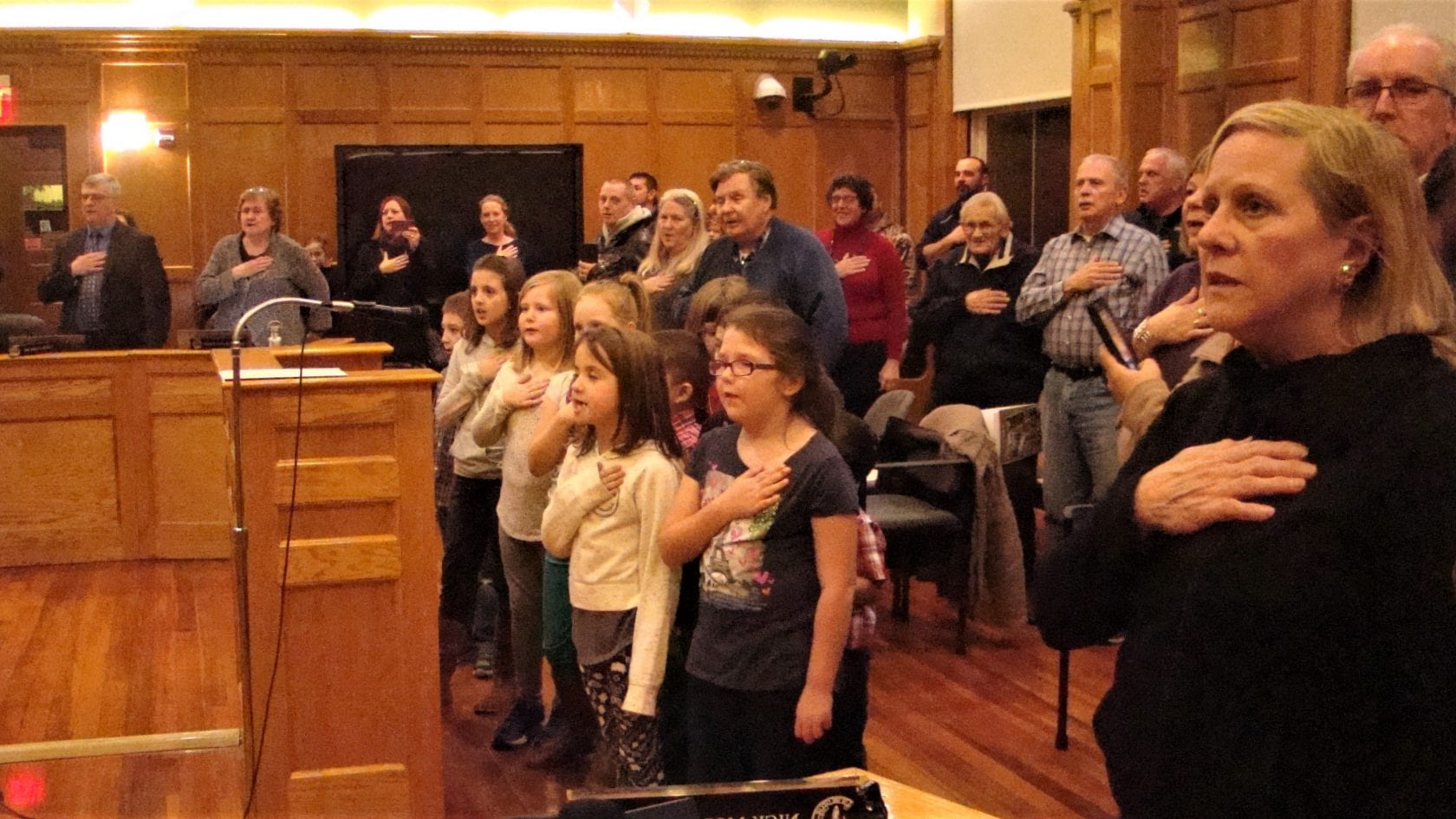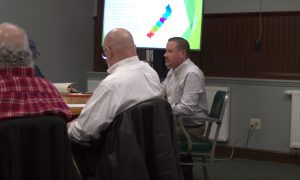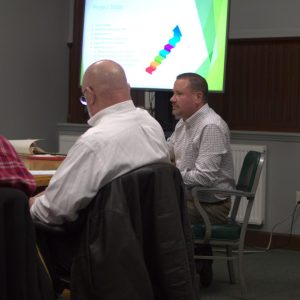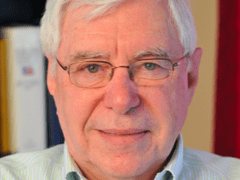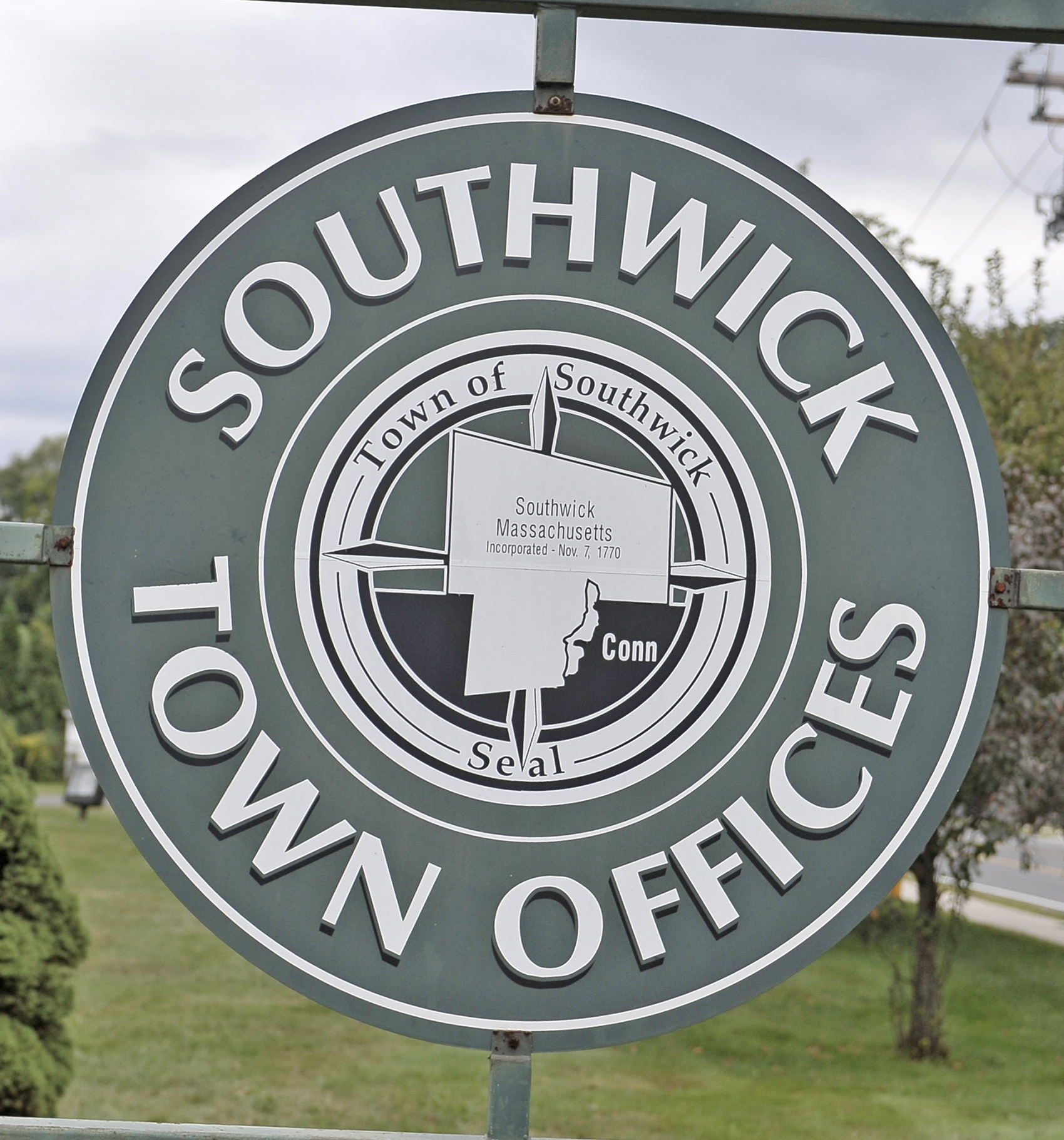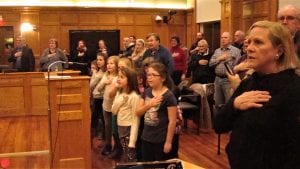
Second grade students from Paper Mill were invited to lead the Pledge of Allegiance at City Council Thursday. (Photo by Amy Porter)
WESTFIELD – In a repeat of the two and a half hour public hearing at the Planning Board on Tuesday on special permit granting authority, the City Council’s hearing was by necessity repetitive in other ways, with many of the speakers explaining to a new audience their positions on why certain commercial permits should or should not be transferred to the Planning Board from the City Council. The motion was ultimately transferred to the Zoning, Planning and Development sub-committee.
At-large Councilor Brent B. Bean, II once again introduced the motion from the Ad-hoc Business Development committee, of which he is a member. He said that the Planning Board hears fifty plus special permit requests a year, and the City Council does them twice a year. He reiterated that all changes are not residential, but commercial; and the idea came from a study by Northeastern University on the pace of permitting in the city.
City Advancement office Joe Mitchell said in the economic development part of his job, he takes calls from businesses interested in Westfield. He said in the reactive part of this job, he does what he can to advance a project. In the proactive part, he tries to remove impediments to business development.
He said in the summer of 2017, he won a $5,000 grant for an economic development self-assessment tool. He brought together city councilors, business owners, and representatives from Westfield State University, the ANG 104th Fighter Wing and the Chamber of Commerce on a committee to identify strengths and weaknesses in the area. Mitchell said strengths identified were the city’s proximity to the rail and highway, and its municipal light plant. Weaknesses were the tax rate, ELA and math proficiency out of high school, and permitting.
Mitchell said when you need a special permit from the City Council it takes more time, and creates some uncertainty, which he said would be eased by putting special permits under one body. He said when the Business Development committee first looked at it, an early draft included some residential permits, but they settled on business zones only. He said the City Council moved the motion forward to the Planning Board in its Nov. 18 meeting.
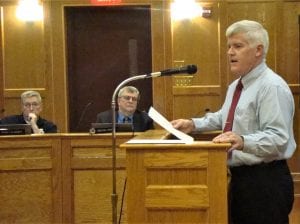
City Advancement officer Joe MItchell presents the proposal on special permit granting authority to the City Council. (Photo by Amy Porter)
Mitchell ran down each business zoning category, saying the majority of special permits in each are under the Planning Board. He said they used to all be under it, but beginning in 1989 until 2005, several categories were transferred under the granting authority of the City Council. He said the reason for changing it back would be to offer consistency. He said the Planning Board makes decisions on the merits of each proposal. He also said the reason he is there, is to lower taxes by bringing in business.
Ward 3 Councilor Andrew K. Surprise commented that in some communities, such as Chicopee, all special permits are handled by the City Council. Surprise said he didn’t want the responsibility, but at the same time, “they can’t get rid of you (Planning Board), they can get rid of us.”
“What I see is a larger issue,” said At-large Councilor Matthew Emmershy. He said there are issues with the city’s current zoning laws; which, in his view need a wholesale review. “Is this trying to fix a band aid on a trauma wound, or should we really be looking at zoning,” he said.
Mitchell called it a “fair question.” He said he would love to have a comprehensive review of zoning.
Ward 1 Councilor Mary Ann Babinski agreed, saying zoning in the city has become a patchwork. “There are things we lost track of,” she said, saying she hopes out of these discussions a committee can be formed which includes members of the City Council, the Planning board and residents. “Residents need to be a part of it,” she said.
At-large Councilor Dave Flaherty focused on the word “special” permit. He said to him, it means rare. “They’re not by right for good reason,” he said.
Mitchell responded that special can mean rare. “How rare are auto dealerships,” he asked, adding that in this context it means special consideration.
Root Road resident Constance Adams asked whether there were any environmental representatives on the EDSAT committee team. Mitchell said there weren’t, but in the future, he would make sure to include them.
Speaking in favor of the petition, business owner Daniel Lawry said he was in favor of moving some special permits to the Planning Board due to considerations of cost and time. He said the Planning Board has the expertise to hear them.
Planning Board member John Bowen said he was speaking as a citizen. He said Mitchell was streamlining a process to make it easier for businesses to come into the city. “It appears now that it’s Planning Board vs. City Council. That’s not true at all,” he said, adding that the Planning Board always lets citizens talk, and what they say is taken into consideration. “In my opinion, I would like to see this passed and move to a committee for review. Some (special permits) should be in the Planning Board; some in the City Council,” Bowen said.
Cheryl Crowe of the Planning Board also spoke. “Tuesday was a tough night. The Planning Board was under siege,” she said. She said they work well together, and challenge each other, adding that while she supports the motion, she also sees the other side. She also talked about the work put into special permits and site plans, adding that she personally goes to many of the sites under review, and the Planning Board adds conditions to the permits they grant.
Ward 2 Councilor Ralph J. Figy asked to enter into the record a statement of support for the proposal from Ali Salehi, president of Columbia Manufacturing.
At-large Councilor Dan Allie said he supports the idea of streamlining, where it makes sense. He said some of the items should go to the Planning Board; some affect quality of life, and should be in the City Council. He said he favors a review of zoning, in particular all businesses allowed in Business A and B, and should also consider raising the pay of Planning Board members. “Right now, unless we address these issues, I’m a no vote,” Allie said.
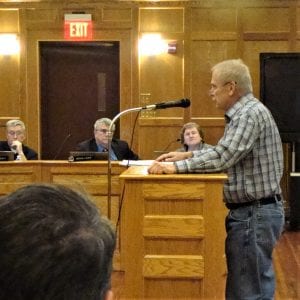
Former Councilor William Chiba shed some light on why some special permits had moved under the City Council. (Photo by Amy Porter)
New information came from former Councilor William Chiba, who said he was elected twelve times, and was involved in moving some permits to the City Council, and in writing the zoning code. He called zoning “a product of the times,” and said at the time the city was going through a change, with many developments going in, and business zones being created on the north side, near the turnpike and airport. He said businesses and realtors were determining where to locate business. Chiba said they put truck terminals and other items under the City Council to take responsibility for them.
Chiba said when the City Council has a special permit, it goes to the Planning Board to give them a report with conditions. “The Council listens to the people. The residents have a different perspective. You can take what they say to satisfy and mitigate. You should not give this over to the Planning Board,” Chiba said, adding there was a reason for everything that was done. He emphasized that the Council has the authority because residents put them there to make decisions.
“Don’t change things just to change them. Study them. Have respect for the people who came before you. It’s not your job to see how fast you can permit them. It’s your job to have the community protected,” Chiba said.
Bean said that while he can appreciate the work that was done, politics did play a part in the decisions. He asked Chiba whether, with the water problems on the north side, if they considered where business zones were in terms of the aquifer. Chiba responded that Councilor Barbara Sword was a very big proponent of the aquifer, which he said played in to every decision. “Back then it was kind of understood; north side, business.”
Chiba also said he served two years on the ZBA, which wrote the special permit decisions, which were then given to the Law Dept. He said he agreed that it was time to sit down and go through it again. He also said the City Council should not give away its authority.
More residents spoke against the transfer of special permit granting authority during the hearing, which lasted until almost 10 p.m. Richard Salois, who said he grew up on the north side, said the Council “should have a better pulse on the people.”
Constance Adams said she believes the changes would disenfranchise the voters, and accelerate the development of lands that should be protected. She also said the problem is not with special permits but with clean water, and the inspection and enforcement capabilities in the city. Adams referred to Westfield’s recent report on open space and recreation, which found that number one and two priorities are an abundant and clean water supply, and large connected blocks of undeveloped land.
Matthew Roman, who said he remembers when Chiba was on the City Council, said a lot of mistakes were made at that time, which should not be made now. Bridget Matthews commented that some Planning Board are elected, a change she favors.
Flaherty said he was also opposed to the motion, saying the Planning Board doesn’t have the same contact with citizens. He also added that he was going to look into having an elected board. He said in many towns the City Council is the special permit granting authority by default, and the Planning Board is the authority for site permits.
Bean commended Mitchell for bringing the proposal forward. “Just because I’m in favor, doesn’t mean we’re going to pass it or not. It’s one of the tools to market the city, and give us a chance to clean up those redundancies,” he said. He said he was in favor of a review of the changes made over the last ten years on a one by one basis. “We need to be mindful of what we look like by outside businesses,” he said.
Council president John J. Beltrandi, III thanked everyone for attending the hearing. A motion was made to move the proposal to Zoning, Planning and Development sub-committee, chaired by Dave Flaherty, which passed with no objection.

